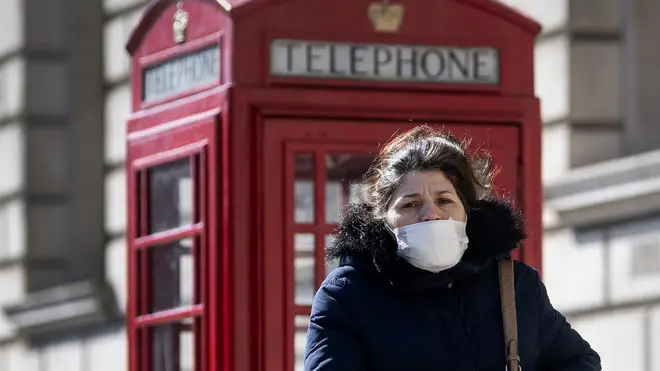
James O'Brien 10am - 1pm
26 March 2020, 08:21

What are the symptoms caused by the Covid-19 virus, how does it spread, and should you see a doctor?
With the UK on lockdown and people only allowed to leave their homes for limited reasons due to the spread of coronavirus, many people have been asking what is Covid-19.
The new Covid-19 coronavirus has infected almost every country in the world since it started in China at the start of the year. So far more than 467,000 people are known to be infected while there have been over 21,000 deaths - including 465 in the UK.
Read more: Can you drive during the UK coronavirus lockdown?
Read more: Coronavirus: Beard sanitiser sales spike after NHS urged staff to shave
Here's everything we know so far:
It is a virus in the coronavirus family, the World Health Organisation said it has never been encountered before. The virus has transferred from humans to animals and the WHO has declared it a pandemic.
Coronaviruses are a family of viruses that cause disease in animals. Seven, including the new virus, have made the jump to humans, but most just cause cold-like symptoms.
The World Health Organisation says the common symptoms are fever, tiredness and a dry cough.
According to the WHO some patients may also have a runny nose, sore throat, nasal congestion and aches and pains or diarrhoea.
Around 80% of people who get Covid-19 experience a mild case – about as serious as a regular cold – and recover without needing any special treatment.
The WHO says the elderly and people with underlying medical problems like high blood pressure, heart problems or diabetes, or chronic respiratory conditions, are at a greater risk of serious illness from Covid-19.
Read more: How long does Covid-19 live on surfaces, and is it safe to get overseas post?
In the UK, the National Health Service says the specific symptoms to look for are:
-a high temperature - you feel hot to touch on your chest or back
-a new continuous cough - this means you’ve started coughing repeatedly
Doctors have said antibiotics have no impact on Covid-19 and recovery depends on the strength of the immune system.
Symptoms are thought to appear between two and 10 days after contracting the virus, but it may be up to 24 days.
Read more: Who is a key worker and what children are classed as vulnerable in UK school closures?
All the advice form healthcare professionals say do not visit your GP. The NHS advice is that anyone with symptoms should stay at home and self isolate for at least seven days.
If you live with others they should self-isolate for at least 14 days.
This means the virus will not be spread outside of your home and applies to everyone even if they have not visited the heavily infected areas.
While you should not visit your GP you can look at the NHS 111 coronavirus website for more information. The NHS advise if your symptoms last longer than seven days people should call 111.
People having difficulty breathing should seek medical attention quickly. But do not go out. Instead, you should call NHS 111.
In an emergency you should dial 999.
Read more: Coronavirus and pregnant women: What is the official government advice?
There is currently no vaccine, but scientists around the world are racing to produce one thanks to China's prompt sharing of the virus's genetic code.
However, UK authorities have warned a potential vaccine could take more than a year to develop.
Read more: Coronavirus - Who should self-isolate and for how long?
Experts say they are not sure yet how dangerous Covid-19 is, and won't be able to tell until there is more data available. Estimates of the mortality rate have ranged from below 1% in the young to over 3% among those who are elderly or have underlying health conditions.
While normal seasonal flu typically has a mortality rate below 1% and is thought to cause about 400,000 deaths each year globally.
Unlike flu there is no vaccine for Covid-19 which means it is more difficult for vulnerable members of the population – elderly people or those with existing respiratory or immune problems – to protect themselves.
One key piece of Government advice is to wash your hands more frequently than you normally would, for at least 20 seconds, with soap and water.
No, coronavirus exists in several forms. Severe acute respiratory syndrome (Sars) and Middle Eastern respiratory syndrome (Mers) are both caused by coronaviruses that came from animals.